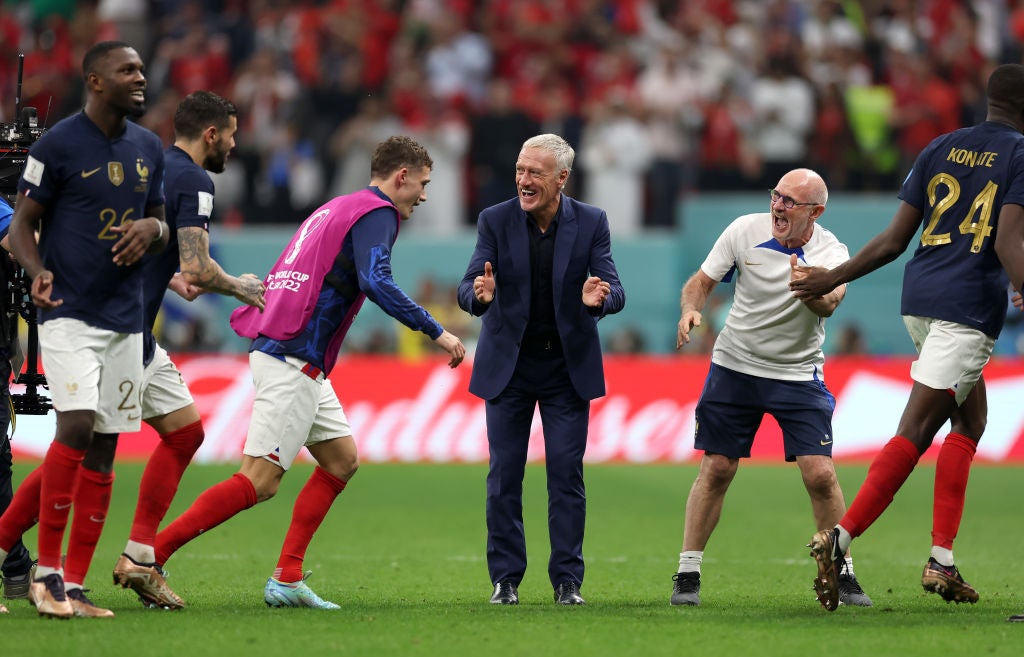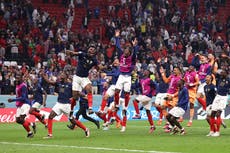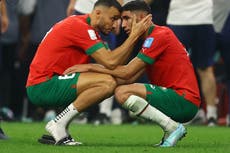Masters of moments France put entertainment aside to reach another World Cup final
There is a sense that Les Bleus do enough to win and no more, but under Deschamps they have won eight World Cup knockout ties and scored first in each
Think of France in a World Cup semi-final and the image that may spring to mind dates back four decades. It is so vivid, so shocking, the assault by the West German goalkeeper Toni Schumacher on Patrick Battiston that it remains one of the most infamous moments in footballing history. At the time, it was not even deemed a foul. France, who played some beautiful football in 1982, went out on penalties, moral winners in a 3-3 draw but actual losers.
They have won four World Cup semi-finals since then, three involving Didier Deschamps, none with as many goals as they got in 1982, none as memorable, each with something of a recurring theme. France were not necessarily emphatic winners, but they were winners. Like Croatia in 1998, Portugal in 2006 and Belgium in 2018, Morocco could reflect on what might have been. Like Croatia 24 years ago, another country in their maiden semi-final on this stage, they are entitled to feel they were the better team.
It may not matter. Better to be serial winners than gallant losers. If Deschamps’ trophy collection is impressive enough, he also has a habit of steering sides through semi-finals, from the 2004 Champions League to the 2022 World Cup. Each is a means to an end. The sense is that his France do enough and no more, offering a kind of efficiency, even if they had to exert plenty of effort on an evening when Morocco tested their resolve and their legs alike.
The image can be unfair. His France, after all, are the only team to score four goals in a World Cup final since England in 1966; their 4-3 triumph over Argentina was the match of the last tournament and plenty would settle for similar entertainment in Sunday’s rematch at Lusail. But for Deschamps, the point of knockout football is that someone else gets knocked out. “There’s emotion, there’s pride, there’s a final step,” he said. There often is where he is concerned.
If the quarter-final victory over England reminded him of his 2018 semi-final win against Belgium, beating Morocco was another hard-fought affair. “It is great to be through to the final but it was not an easy victory,” Deschamps said. “We needed a mixture of quality, experience, team spirit and in difficult periods we had to dig deep.”
In that respect, it was quintessential Deschamps. So was the opener; not in the sense that left-back Theo Hernandez scored it, but in the respect that Les Bleus did. France have conceded first to Australia and Tunisia in the last month but when the first goal assumes most importance, they tend to get it. They have won eight World Cup knockout ties under Deschamps and, in each, they have broken the deadlock. Hernandez’s goal felt especially significant as Morocco had never had to chase a game this World Cup. They made a valiant attempt but had to play in a different context. Walid Regragui’s Atlas Lions showed they are much more than a defensive team. France showed they can defend.
The pragmatic element to Deschamps’ football seemed summed up by a statistic: France had 39 per cent of possession, down from 42 against England. The paradox of Deschamps’ France is that they have been the best side in the tournament without necessarily looking the better team for swathes of their past two matches.

They needed individuals to excel: Jules Kounde with a goal-line clearance, Ibrahima Konate with a similarly vital intervention, Aurelien Tchouameni with another commanding performance in midfield, Antoine Griezmann as both chance creator and unexpected ally to the defence, Olivier Giroud rattling the post in a rumbustious start. Plenty played well and some of the French formula is based around having a lot of very good players. But their brand of superiority is not based upon imposing a style of play: partly because they can be devastating on the break, partly because of their organisation out of possession.
And a reason they do not dominate games is that they do not need to. France win matches by winning moments. In that sense, Kylian Mbappe is their Lionel Messi, the difference-maker. Both goals stemmed from Mbappe’s threat, just as Argentina’s can come when Messi springs to life. Sunday’s final could be billed as the World Cup holders against the world’s best ever player. Certainly, Messi finds a fitting foe to conclude his lengthy attempt to win a trophy Deschamps has already lifted as captain and manager. “We will do everything humanly possible for that not to happen,” said the France manager. “At the end of the day, someone is getting a third star on their shirt.” And it would not just be France’s third World Cup, but a personal hat-trick for Deschamps as well.
Join our commenting forum
Join thought-provoking conversations, follow other Independent readers and see their replies
Comments


Bookmark popover
Removed from bookmarks